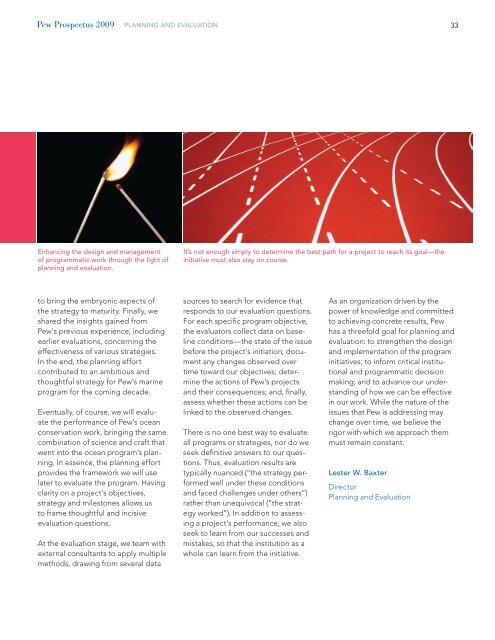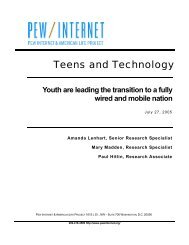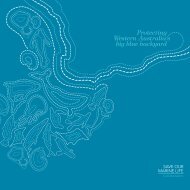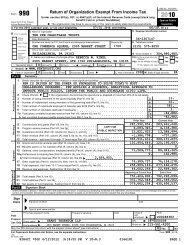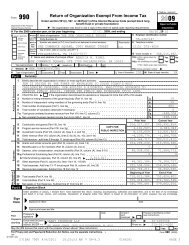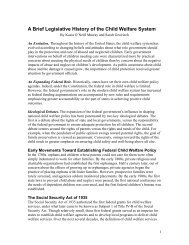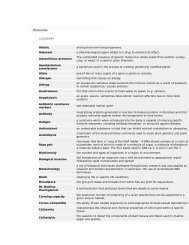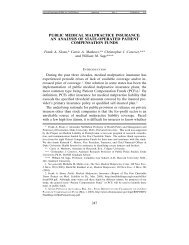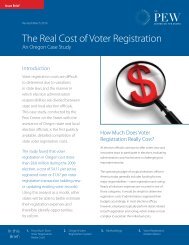PROSPECTUS - The Pew Charitable Trusts
PROSPECTUS - The Pew Charitable Trusts
PROSPECTUS - The Pew Charitable Trusts
You also want an ePaper? Increase the reach of your titles
YUMPU automatically turns print PDFs into web optimized ePapers that Google loves.
<strong>Pew</strong> Prospectus 2009<br />
Planning and EVALUATION<br />
33<br />
Enhancing the design and management<br />
of programmatic work through the light of<br />
planning and evaluation.<br />
It’s not enough simply to determine the best path for a project to reach its goal—the<br />
initiative must also stay on course.<br />
to bring the embryonic aspects of<br />
the strategy to maturity. Finally, we<br />
shared the insights gained from<br />
<strong>Pew</strong>’s previous experience, including<br />
earlier evaluations, concerning the<br />
effectiveness of various strategies.<br />
In the end, the planning effort<br />
contributed to an ambitious and<br />
thoughtful strategy for <strong>Pew</strong>’s marine<br />
program for the coming decade.<br />
Eventually, of course, we will evaluate<br />
the performance of <strong>Pew</strong>’s ocean<br />
conservation work, bringing the same<br />
combination of science and craft that<br />
went into the ocean program’s planning.<br />
In essence, the planning effort<br />
provides the framework we will use<br />
later to evaluate the program. Having<br />
clarity on a project’s objectives,<br />
strategy and milestones allows us<br />
to frame thoughtful and incisive<br />
evaluation questions.<br />
At the evaluation stage, we team with<br />
external consultants to apply multiple<br />
methods, drawing from several data<br />
sources to search for evidence that<br />
responds to our evaluation questions.<br />
For each specific program objective,<br />
the evaluators collect data on baseline<br />
conditions—the state of the issue<br />
before the project’s initiation; document<br />
any changes observed over<br />
time toward our objectives; determine<br />
the actions of <strong>Pew</strong>’s projects<br />
and their consequences; and, finally,<br />
assess whether these actions can be<br />
linked to the observed changes.<br />
<strong>The</strong>re is no one best way to evaluate<br />
all programs or strategies, nor do we<br />
seek definitive answers to our questions.<br />
Thus, evaluation results are<br />
typically nuanced (“the strategy performed<br />
well under these conditions<br />
and faced challenges under others”)<br />
rather than unequivocal (“the strategy<br />
worked”). In addition to assessing<br />
a project’s performance, we also<br />
seek to learn from our successes and<br />
mistakes, so that the institution as a<br />
whole can learn from the initiative.<br />
As an organization driven by the<br />
power of knowledge and committed<br />
to achieving concrete results, <strong>Pew</strong><br />
has a threefold goal for planning and<br />
evaluation: to strengthen the design<br />
and implementation of the program<br />
initiatives; to inform critical institutional<br />
and programmatic decision<br />
making; and to advance our understanding<br />
of how we can be effective<br />
in our work. While the nature of the<br />
issues that <strong>Pew</strong> is addressing may<br />
change over time, we believe the<br />
rigor with which we approach them<br />
must remain constant.<br />
Lester W. Baxter<br />
Director<br />
Planning and Evaluation


